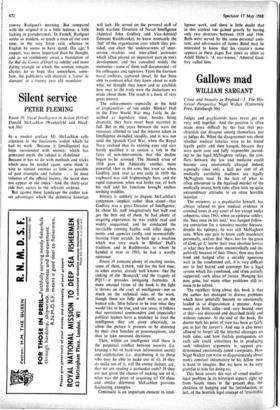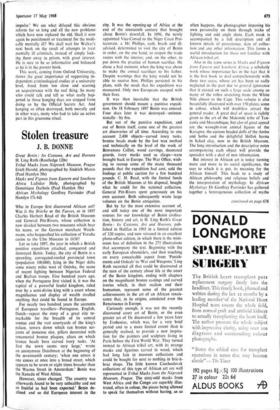Gallows mad
WILLIAM SARGANT
Judges and psychiatrists have never got on very well together. And the position is often made more difficult by the fact that psy- chiatrists can disagree among themselves, just as judges do. When the disagreement was about whether medical lunatics were to be found legally guilty and then hanged, because they were quite sane and fully responsible accord- ing to the legal McNaghten rulings, the con- flicts between the law and medicine could become very emotionally charged indeed, especially since only a half per cent of all medically certifiable madmen are legally McNaghten mad. In the face of what so often amounted to the legalised murder of the medically insane, both sides often took up quite extraordinary attitudes to an often horrible injustice.
The reviewer, as a psychiatrist himself, has always refused to give medical evidence in criminal cases in any court of law except under subpoena, since 1943, when an epileptic soldier, the 'best man in his unit,' was hanged follow- ing conviction for a senseless murder because, despite his epilepsy, he was still McNaghten sane. When one gets to know such murderers personally, realises that 'there, but for the grace of God, go I,' learns their own absolute horror at what they have done uncontrolledly and im- pulsively because of their illness; then sees them tried and hanged after a suitably agonising wait in the condemned cell, it is very difficult not to feel hatred and contempt for a legal system which has condoned, and often actively supported, such ideas of justice. Hanging has now gone, but many other problems still re- main to be solved.
The excellent thing about this book is that the author has managed to discuss problems which have generally become so emotionally loaded in so dispassionate a manner. Argu- ments on both sides—and very heated ones at that—are discussed and described fairly and without rancour. At the end of the book, the doctor feels his point of view has been as fairly put as has the lawyer's. And one is also never allowed to forget all the internal cleavages on both sides, and how foolish protagonists on each side could sometimes be in producing such ridiculous arguments to support pre- determined emotionally toned viewpoints. How Nigel Walker can write so dispassionately about man's constant inhumanity to his fellow men is hard to imagine. But we have to be very grateful to him for doing so.
This book covers this sort of vexed medico- legal problem in its historical aspects right up from Saxon times to the present day, the abolition of hanging and the introduction, at last, of the Scottish legal concept of 'irresistible
impulse.' We see what delayed this obvious reform for so long and all the new problems which have now replaced the old. Shall it now again be punishment or treatment for the medi- cally mentally ill? We shall wait for Walker's next book on the result of attempts to treat mentally ill criminals, instead of simply lock- ing them away in prison, with great interest. He is sure to be as informative and balanced as he is in the present book.
This work, coming from Oxford University, shows the great importance of supporting in- dependent criminological studies at a university level, freed from too close and scarring an acquaintance with the real thing. So many who could talk and tell us what really hap- pened in those hanging days are stopped from doing so by the Official' Secrets Act. And hanging so often destroyed, both morally and in other ways, many who had to take an active part in this gruesome ritual.







































 Previous page
Previous page